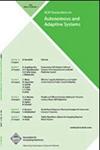工程普及服务生态系统:SAPERE方法
IF 2.2
4区 计算机科学
Q3 COMPUTER SCIENCE, ARTIFICIAL INTELLIGENCE
引用次数: 50
摘要
新兴的普及计算服务通常涉及大量设备和服务组件在开放和动态的环境中协同工作。这需要合适的模型和基础设施来促进组件之间自发的、定位的和自适应的交互。SAPERE(自我意识的普适服务生态系统)是一个通用的协调框架,旨在促进自组织和自适应普适计算服务的分散和定位执行。SAPERE采用了一种受自然启发的方法,在这种方法中,普适性服务被建模并部署为其他服务和设备组成的生态系统中的自主个体,所有这些服务和设备都按照一组有限的协调规律或生态规律进行交互。在本文中,我们将介绍SAPERE及其参考体系结构的基本原理。我们介绍了基于生态规律的协调模型,并展示了如何使用它来表达和容易地执行通用的自组织协调模式。介绍并评估了支持SAPERE模型的中间件基础设施,并在示例用例的上下文中讨论了SAPERE的总体优势。本文章由计算机程序翻译,如有差异,请以英文原文为准。
Engineering Pervasive Service Ecosystems: The SAPERE Approach
Emerging pervasive computing services will typically involve a large number of devices and service components cooperating together in an open and dynamic environment. This calls for suitable models and infrastructures promoting spontaneous, situated, and self-adaptive interactions between components. SAPERE (Self-Aware Pervasive Service Ecosystems) is a general coordination framework aimed at facilitating the decentralized and situated execution of self-organizing and self-adaptive pervasive computing services. SAPERE adopts a nature-inspired approach, in which pervasive services are modeled and deployed as autonomous individuals in an ecosystem of other services and devices, all of which interact in accord to a limited set of coordination laws, or eco-laws. In this article, we present the overall rationale underlying SAPERE and its reference architecture. We introduce the eco-laws--based coordination model and show how it can be used to express and easily enforce general-purpose self-organizing coordination patterns. The middleware infrastructure supporting the SAPERE model is presented and evaluated, and the overall advantages of SAPERE are discussed in the context of exemplary use cases.
求助全文
通过发布文献求助,成功后即可免费获取论文全文。
去求助
来源期刊

ACM Transactions on Autonomous and Adaptive Systems
工程技术-计算机:理论方法
CiteScore
4.80
自引率
7.40%
发文量
9
审稿时长
>12 weeks
期刊介绍:
TAAS addresses research on autonomous and adaptive systems being undertaken by an increasingly interdisciplinary research community -- and provides a common platform under which this work can be published and disseminated. TAAS encourages contributions aimed at supporting the understanding, development, and control of such systems and of their behaviors.
TAAS addresses research on autonomous and adaptive systems being undertaken by an increasingly interdisciplinary research community - and provides a common platform under which this work can be published and disseminated. TAAS encourages contributions aimed at supporting the understanding, development, and control of such systems and of their behaviors. Contributions are expected to be based on sound and innovative theoretical models, algorithms, engineering and programming techniques, infrastructures and systems, or technological and application experiences.
 求助内容:
求助内容: 应助结果提醒方式:
应助结果提醒方式:


